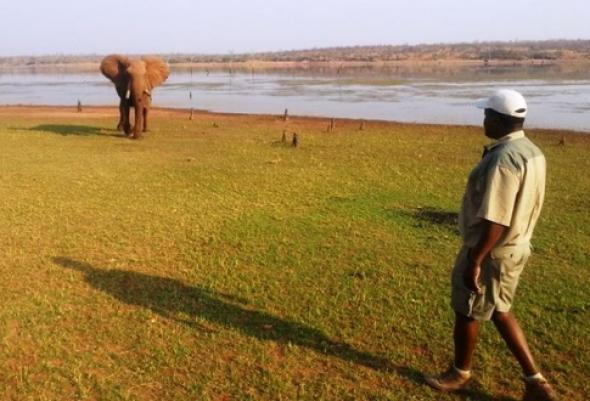This question originally appeared on Quora.
Answer by Rory Young, professional guide, ranger, tracker, and writer with 23 years in wildlife and forest management:
In most African countries, the list of animals legally defined as “dangerous game” includes lion, leopard, elephant, white rhinoceros, black rhinoceros, Cape buffalo, hippopotamus, and crocodile. Others, such as hyena, numerous venomous snakes, and such seemingly passive creatures such as ostriches and bushbuck are not classified as dangerous game but are potentially deadly.
The very broad rule of thumb is that predators are potentially, but not only, deadly if they see you as prey, and nonpredators are potentially, but not only, deadly when they see you as a threat.
I would never recommend playing dead with African dangerous game. I have only heard of it being used with buffalo in East Africa, and that is supposedly because they can’t easily gore you when you are lying on the ground, not because they believe you are dead and therefore no longer a threat. The most dangerous animals are not easily fooled, and they may just have a go to be sure.
Playing dead—or lying down, rather—is a good way to get their curiosity. I have often brought a herd of elephants or buffalo closer by lying on the ground and waving my arms and legs in the air. I think there is good reason for the fact that no African mammals play dead like an opossum does in North America.
Furthermore, lions, leopards, and hyena (but not cheetah) are all more than happy to eat really putrid carrion, so they will just see you as an easy meal.
If you encounter nonpredatory dangerous game such as buffalo or elephants, then get the hell out of there ASAP. With rhino or buffalo, climbing a tree is a good option if you are fast and the tree is suitable, but it is not a good idea with elephants, as they will just pull you out. Standing down and intimidating an elephant is an option if you know what you are doing, but I would recommend getting out of there if you are not an expert. Experts can read elephant gestures and body language and determine how to respond, but this takes years of study and experience.
Rhinos are as blind as bats, so standing stock still can work as long as they definitely don’t have you in their sight and as long as the wind is definitely in your favor. I have often used this technique. Black rhinos will sometimes charge in arbitrary directions to try and intimidate you into moving and betraying your position. Again, I recommend a tree.
If you encounter predators and they are approaching you with interest, then you need to threaten or intimidate them with noise and confident body language and attitude.
In the water with crocodile and also hippo, your only option is to get out of there. They will both (albeit for different reasons) attack you whether you are playing dead or not.
For all dangerous game, unless you are an expert, steer well clear of them and leave them in peace. There are many good makes of binoculars available. The only two parks in Africa that still allow private individuals to walk are Mana Pools and Matusadona in Zimbabwe. Although most people prefer to hire a professional guide to take them walking in these parks, there are still those who try to walk without any real knowledge and experience, and every year there are a number of fatalities and serious injuries.
The only way to summarize what to do and how to behave is a single word: RESPECT!
The Tashinga Initiative in Zimbabwe is a professional and dedicated group fighting with everything they have to save the wildlife within the region.
More questions on Wildlife:
